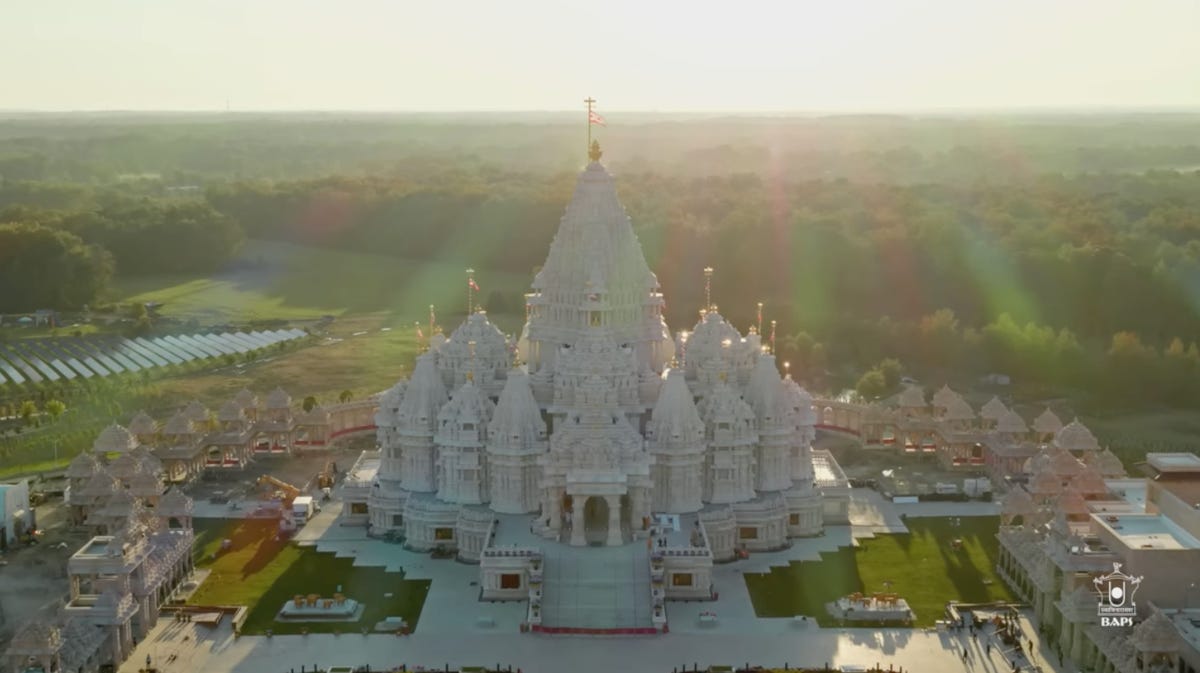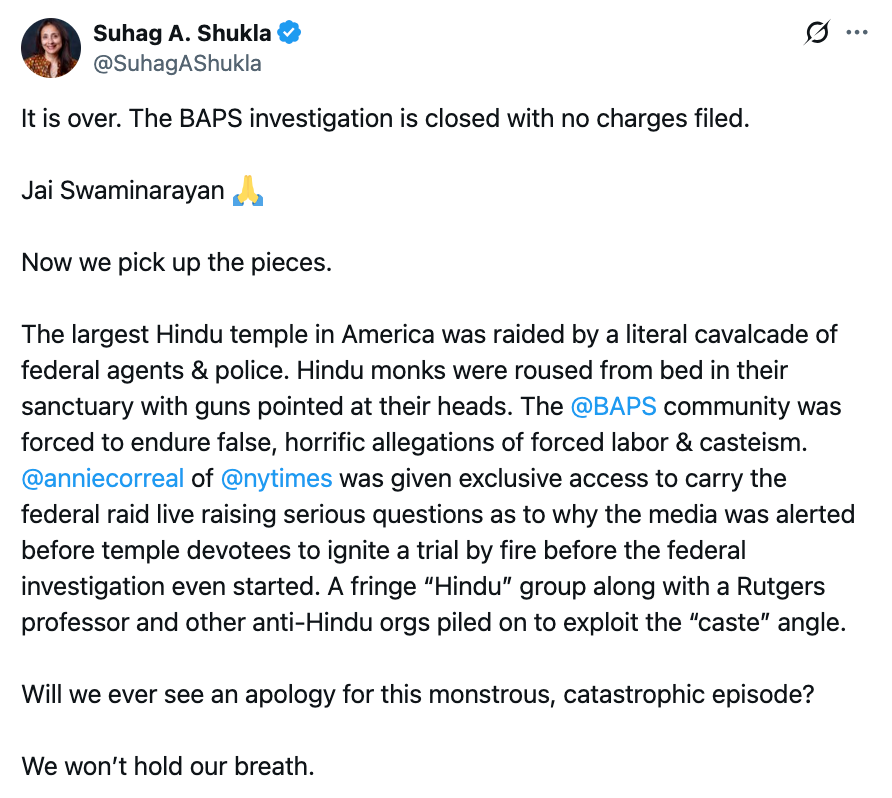Trump's Justice Dept. drops probe into Hindu sect that paid workers $1.20/hr to build temple
The New Jersey BAPS temple that allegedly exploited Indian workers will escape accountability as a civil lawsuit drags on
This newsletter is free and goes out to over 22,000 subscribers, but it’s only able to sustain itself due to the support I receive from a small percentage of regular readers. Would you please consider becoming one of those supporters? You can use the button below to subscribe or use my usual Patreon page!
The Department of Justice has closed its investigation into a Hindu temple in New Jersey that was accused of using forced, low-paid labor to construct its building. Four years after the temple was raided by federal officials, the case is ending with a pathetic whimper.
The case involved the Hindu sect known as Bochasanwasi Akshar Purushottam Swaminarayan Sanstha (BAPS), perhaps best known for its large (beautiful) temples around the country. It was the one in Robbinsville, New Jersey that made headlines in 2021 for all the wrong reasons.

According to a federal lawsuit filed that year, the denomination was effectively using forced labor to build the temple—now the largest Hindu temple in the country—bringing in dozens of low-caste workers from India, paying them roughly $1.20/hour, and forcing them to live on temple property. More than 200 workers were brought to the facility, though only six men were specifically named in the initial lawsuit:
They were brought to the United States on religious visas, or R-1 visas—temporary visas used for clergy and lay religious workers such as missionaries—and presented to the U.S. government as volunteers, according to the claim. They were asked to sign several documents, often in English, and instructed to tell U.S. embassy staffers that they were skilled carvers or decorative painters, the complaint said.
Lawyers for the men, however, said they did manual labor on the site, working nearly 13 hours a day lifting large stones, operating cranes and other heavy machinery, building roads and storm sewers, digging ditches and shoveling snow, all for the equivalent of about $450 per month. They were paid $50 in cash, with the rest deposited in accounts in India, the complaint said.
Federal agents then raided the property in May of 2021 and removed about 90 workers from the site. The temple denied any wrongdoing.
There was also a political angle to all this: As the New York Times put it at the time, BAPS has "strong ties" with India's Prime Minister Narendra Modi, a Hindu Nationalist. Modi even spoke at the funeral for the denomination's spiritual leader a few years prior to the raid. To please Modi, the BAPS organization also promised to build a temple in Ayodhya, India in a space that (controversially) housed an Islamic mosque before it was destroyed by Hindu extremists in 1992.
As this civil lawsuit was going through the legal system, it hit a few snags. More plaintiffs were added. Some requested to be removed, saying they were duped into joining this lawsuit. But because the government was supposedly investigating any potential criminal actions, the lawsuit was put on hold for years until that inquiry could be completed.
Last week, BAPS officials learned the investigation was finally completed… or at least the DoJ no longer cared about this situation.
BAPS North America released a statement saying the case was closed. No criminal charges would be filed.
The BAPS Swaminarayan Sanstha in the United States welcomes the decision by the United States Department of Justice and the United States Attorney’s Office for the District of New Jersey to close their investigation of BAPS and the creation of BAPS Swaminarayan Akshardham.
The United States Government’s decision to end this investigation sends a clear and powerful message in support of what our organization has maintained from the outset: that BAPS Swaminarayan Akshardham—a place of peace, service, and devotion—was built through the love, dedication, and volunteer service of thousands of devotees from all walks of life.
To be clear, that doesn’t say the temple didn’t use cheap labor. It only says the DoJ is no longer looking into the matter. You have to wonder whether Trump’s affinity for fellow autocrats like Modi had anything to do with his administration dropping this particular case. (While that’s purely speculation, it hardly seems out of the question.)
That also means the civil lawsuit can finally continue, though it’s unclear if that will go anywhere at this point.
The construction of the temple was completed in 2023, and since that time, advocates for the temple have defended everything that happened, saying that the workers’ service was just being misinterpreted. They were volunteers. They were doing it out of love for their faith.
Yogi Trivedi, a scholar of Hinduism at Columbia University and BAPS practitioner, said cultural and religious mistranslation has complicated the labor allegations. The concept of seva, a central tenet of this sect of Hinduism, does not translate directly to Western concepts of volunteerism.
“The purpose of Seva is not to just complete a project,” he told RNS. “It’s not just to provide community service or just to be a humanitarian. It’s actually to better yourself and come closer to the Divine by realizing yourself, your soul.
“When I saw thousands of sevaks give so much of their life to essentially move their families here to come and serve, I couldn’t but feel remorse at the fact that their service was misinterpreted, or the concept that drove them to be the way they are now was being misunderstood.”
That would be a little easier to believe if the lawsuit didn’t include harrowing passages like this one:
At the Robbinsville temple and elsewhere, workers were prohibited from speaking with outside visitors to the temple; failure to obey this rule would result in workers’ meager pay being reduced even further, the workers being sent back to India, or other disciplinary action. At times, supervisors told the workers that the police would arrest them if they left. One R-1 worker, Mohan Lal, died while he was subjected to forced labor at the Robbinsville temple; the Defendants overseeing the Robbinsville temple construction then retaliated against workers who organized to demand, among other things, that Mohan Lal’s remains to be treated according to his — not the Defendants’ — religious rituals and that the Defendants improve working conditions.
…
… At the Robbinsville temple and elsewhere, temple leadership did what they could to remind these marginalized workers of their place in the social hierarchy. Defendant Swami Prasanand, for example, called the workers “worms,” thus exacerbating the psychological coercion the workers experienced.
If allegations like those are shown to be true, it would defeat the narrative that the workers were all doing their jobs willingly and voluntarily.
It’s not just one scholar defending all this either. The Hindu American Foundation’s executive director essentially called this whole thing a witch hunt and celebrated the end of the DoJ’s investigation, saying the BAPS community was “forced to endure false, horrific allegations of forced labor & casteism.”
Were the allegations false, though, or are people just interpreting them through rosy religious glasses?
While the case hasn’t been resolved yet, this whole saga has been a chilling reminder that religious zealotry can sometimes mask exploitation. While the BAPS temples, in New Jersey and beyond, may appear to be a monument to Hindu devotion, the lawsuit suggests that its marble façade was built on the suffering of at least a handful of marginalized workers who say they were coerced into their roles.
It’s scary how a “misinterpretation” of their roles is intended to cover up what could also be called injustice.
It’s not surprising that the Trump administration doesn’t want to look into this any further. Maybe that’s because they know what they’ll find and don’t want to offend their ideological allies in India. But there are plenty of other voices denouncing the lawsuit, too, and they’re rationalizing the alleged abuse in their own ways.
No one should be celebrating how vulnerable people were sacrificed for this project. Instead of hiring and paying professional constructors, the best-case scenario in this story is that temple officials took advantage of their own volunteers.


Once again we are seeing yet another example of being able to justify anything in the name of religion. Even human slavery.
Once again ... surprised? Not really. I have little doubt but that Trump wants to cootchie-coo Prime Minister Modi, and dismissing an investigation into a situation like this, where the abuse of the workers is so blatantly obvious, is one tactic which is all but an automatic for Donnie.
Still it's tragic. I mean, $1.20 an HOUR labor rate? GET SERIOUS! Even for India, that's ludicrous, though it's the kind of stunt that Trump would have LOVED to pull, himself.
What else to say, I don't know, other than this is one more travesty committed by an unfeeling administration that is more interested in influencing heavyweights than it is in serving ordinary people.